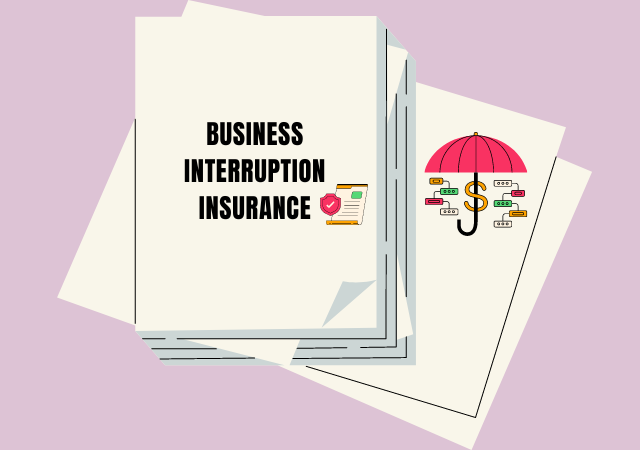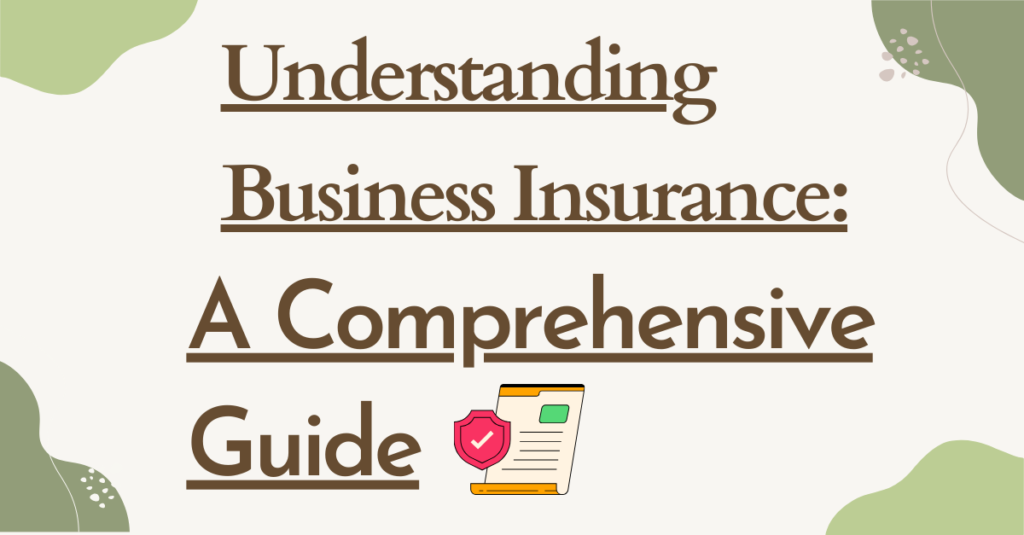Understanding Business Insurance: A Comprehensive Guide
Introduction
In the ever-evolving landscape of business, risk is an omnipresent factor. From natural disasters to lawsuits and unforeseen crises, entrepreneurs and business owners constantly face potential threats to their financial well-being. This is where business insurance steps in as a crucial safeguard. In this comprehensive guide, we will delve into the world of business insurance, exploring its various types, factors affecting costs, selection criteria, and debunking common misconceptions. By the end of this article, you will be equipped with the knowledge to navigate the complex realm of business insurance and secure the future of your enterprise.
The Fundamental Concept: What is Business Insurance?
Business insurance, often referred to as commercial insurance, is a contract between a business and an insurance company. In exchange for regular premium payments, the insurer provides coverage and financial protection to the business in the event of specified risks or losses. These risks can encompass a wide range of scenarios, from property damage to liability claims and more.
The Importance of Business Insurance
Business insurance serves as a safety net for companies, providing peace of mind and financial stability when unforeseen circumstances strike. Here’s why it’s of paramount importance:
- Asset Protection: Businesses invest substantial resources in their physical assets, such as buildings, machinery, and inventory. Property insurance helps protect these assets from risks like fire, vandalism, or natural disasters.
- Liability Coverage: In today’s litigious society, liability claims can cripple a business. Liability insurance shields companies from legal and financial repercussions in cases of accidents, injuries, or lawsuits.
- Employee Protection: Workers’ compensation insurance is often legally mandated and provides coverage for employee injuries or illnesses sustained while on the job. It not only ensures employees receive necessary medical care but also protects the business from potential lawsuits.
- Continuity and Resilience: Business interruption insurance helps companies survive temporary closures due to unforeseen events like natural disasters. It covers lost income, ongoing expenses, and facilitates a quicker recovery.
- Cybersecurity: In an era dominated by technology, cyber insurance guards against cyber threats and data breaches. It’s indispensable for businesses reliant on digital systems and sensitive information.
Now that we’ve established the importance of business insurance, let’s explore the various types and their specific functions.
Types of Business Insurance
Business insurance isn’t a one-size-fits-all solution. Instead, it encompasses several specialized types, each designed to address specific risks and needs within the business world. Let’s break down some of the most common types:
1. Property Insurance

What it covers: Property insurance protects your physical assets, including buildings, equipment, inventory, and even the physical contents of your office or establishment.
Why it’s important: Property damage can result from numerous factors, such as fires, natural disasters, theft, or vandalism. Without adequate coverage, the cost of repairing or replacing these assets could be financially devastating to a business.
2. Liability Insurance

What it covers: Liability insurance safeguards your business against legal claims and financial responsibilities arising from accidents, injuries, or negligence on your part. This can include general liability insurance, professional liability insurance (also known as errors and omissions insurance), and product liability insurance.
Why it’s important: In today’s litigious society, even a minor accident or oversight can lead to costly lawsuits. Liability insurance not only covers legal expenses but also protects your business’s reputation.
3. Workers’ Compensation Insurance

What it covers: Workers’ compensation is typically required by law and provides coverage for employees who suffer work-related injuries or illnesses. It includes medical expenses, wage replacement, and rehabilitation.
Why it’s important: Workers’ compensation not only ensures that injured employees receive necessary care but also shields businesses from potential lawsuits related to workplace injuries.
4. Business Interruption Insurance

What it covers: Business interruption insurance provides coverage for the income your business loses when it is unable to operate due to unforeseen circumstances like a natural disaster. It also covers ongoing expenses during the downtime.
Why it’s important: Business interruptions can have a devastating financial impact, and this insurance helps maintain financial stability and facilitates a faster recovery.
5. Commercial Auto Insurance

What it covers: If your business uses vehicles for deliveries, transportation, or any other purpose, commercial auto insurance is essential. It covers damage to the vehicles and liability in case of accidents involving company-owned vehicles.
Why it’s important: Personal auto insurance policies may not cover accidents that occur while using a vehicle for business purposes. Commercial auto insurance ensures your business isn’t financially burdened by vehicle-related incidents.
6. Cyber Insurance

What it covers: With the increasing prevalence of cyber threats and data breaches, cyber insurance protects your business against the financial repercussions of cyberattacks, including data recovery, legal expenses, and potential fines.
Why it’s important: In today’s digital age, businesses are highly vulnerable to cyber threats. Cyber insurance is a critical component of risk management in the modern business world.
Understanding the specific types of insurance available is a crucial step in tailoring coverage to your business’s unique needs. However, choosing the right insurance is not solely about understanding types; it also involves considering various factors that can influence insurance costs.
Factors Affecting Business Insurance Costs
The cost of business insurance can vary significantly from one company to another. Several factors influence these costs, and understanding them is essential for budgeting and risk management. Here are the key factors:
1. Industry and Business Type
Different industries carry varying levels of risk. Businesses in high-risk industries, such as construction or healthcare, typically face higher insurance premiums due to their increased exposure to potential accidents or lawsuits.
2. Location
The geographic location of your business can impact insurance costs. Businesses in areas prone to natural disasters, like hurricanes or earthquakes, may face higher premiums for property insurance.
3. Size of the Business
Larger businesses with more employees, revenue, and assets generally pay higher premiums. However, they may also have more complex insurance needs.
4. Claims History
Your business’s claims history plays a crucial role in determining insurance costs. A history of frequent claims may result in higher premiums, as insurers perceive higher risk.
5. Coverage Limits and Deductibles
The level of coverage you choose and the deductible you’re willing to pay can significantly affect your insurance costs. Higher coverage limits and lower deductibles typically result in higher premiums.
6. Risk Management Measures
Implementing risk management strategies can help lower insurance costs. Safety protocols, employee training, and security measures can demonstrate your commitment to reducing risks, potentially leading to lower premiums.
Now that we’ve explored the factors that can impact the cost of business insurance, let’s discuss how to navigate the process of choosing the right insurance for your specific business needs.
How to Choose the Right Business Insurance
Selecting the right business insurance can be a daunting task, but it’s a critical one. Here are the key steps to guide you through the process:
1. Assess Your Business Needs
Begin by evaluating your business’s unique risks and needs. Consider the industry you’re in, the size of your company, and the potential risks you face. Identifying your specific requirements is the first step toward adequate coverage.
2. Work with an Insurance Broker
Insurance brokers are experts in the field who can help you navigate the complexities of business insurance. They can assess your needs, recommend suitable policies, and even negotiate with insurers on your behalf to secure the best rates.
3. Compare Quotes and Policies
Don’t settle for the first insurance policy you come across. Shop around, get multiple quotes, and compare coverage options, deductibles, and premiums. This allows you to make an informed decision based on your budget and requirements.
4. Understand Policy Terms and Conditions
Before finalizing any insurance contract, thoroughly read and understand the policy’s terms and conditions. Pay close attention to coverage limits, exclusions, deductibles, and any specific requirements or obligations on your part.
By following these steps, you can tailor your business insurance to your precise needs while keeping costs under control.
Common Business Insurance Myths
Before we conclude our comprehensive guide to business insurance, it’s essential to dispel some common misconceptions surrounding this crucial aspect of risk management.
Myth 1: Insurance is Only for Big Corporations
Fact: Business insurance is not exclusive to large corporations. Small and medium-sized businesses, startups, and even freelancers can benefit from tailored insurance coverage. In fact, smaller businesses may be more vulnerable to financial setbacks caused by unexpected events, making insurance even more critical.
Myth 2: Insurance is Too Expensive
Fact: While insurance premiums are an additional cost, they are a prudent investment in protecting your business’s financial stability. Moreover, insurance premiums can vary widely, and by comparing quotes and policies, you can find coverage that fits your budget.
Myth 3: General Liability Insurance Covers Everything
Fact: General liability insurance is essential, but it doesn’t cover every conceivable risk your business might face. Depending on your industry and specific operations, you may need additional coverage, such as professional liability or cyber insurance, to ensure comprehensive protection.
Debunking these Myths with Real Examples
To illustrate the importance of business insurance and debunk these myths, consider the following scenarios:
- Scenario 1: A small bakery faces a fire that destroys its ovens, equipment, and inventory. Property insurance helps them recover and reopen quickly, preventing a substantial financial loss.
- Scenario 2: A freelance graphic designer is sued by a client who claims that a design error resulted in a significant financial loss. Professional liability insurance covers the legal expenses, protecting the designer’s personal assets.
- Scenario 3: A small online retailer experiences a data breach, compromising customer information. Cyber insurance covers the costs of notifying affected customers, investigating the breach, and implementing security measures.
These real-world examples demonstrate how different types of insurance can make a critical difference in protecting businesses of all sizes and types.
Claim Process and Handling
Understanding how to navigate the claims process is as important as selecting the right insurance coverage. Here’s a brief overview of the steps involved:
1. Reporting a Claim
Promptly report any incidents or claims to your insurance provider. Timely reporting is crucial for a smooth claims process.
2. Working with Your Insurance Company
Cooperate fully with your insurance company during the claims process. Provide all necessary documentation, including photos, reports, and witness statements.
3. Documentation and Evidence
Maintain thorough records of the incident or claim. This includes receipts, invoices, and any correspondence related to the event. The more documentation you have, the smoother the claims process will be.
4. Resolving Claims Efficiently
Work closely with your insurance company to reach a resolution. This may involve negotiations and discussions to ensure you receive the coverage you are entitled to.
Conclusion
In the intricate world of business, insurance stands as a vital pillar of protection against the unforeseen. This comprehensive guide has provided insights into the various types of business insurance, the factors influencing insurance costs, the selection process, and dispelled common myths. Armed with this knowledge, you are better prepared to secure the future of your enterprise, mitigate risks, and ensure its continued success. Remember, while business insurance may seem like an additional cost, it’s a wise investment in safeguarding the financial health and longevity of your business.

My name is Rohit Vagh and I’m a content writer specializing in fashion and lifestyle. I have three years of experience in this field and have written various articles. My writing style is creative and engaging, and I strive to create content that resonates with my readers. I have a deep passion for fashion and am constantly researching the latest trends and styles to make sure my readers are up to date. I’m excited to continue my career in blogging, and I’m always looking for new opportunities in the fashion and lifestyle space.





